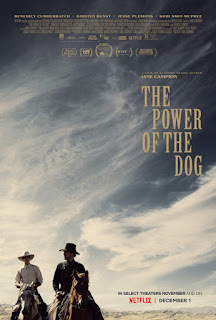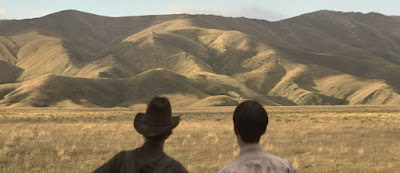or
"Well, Well...I Wonder What Little Lady Made This?"
Jane Campion knows her Westerns. You can tell that with an opening shot of The Power of the Dog, tracking along the windows inside a house, the interior black, but the outside bright with sunlight, focusing on the outsider walking along parallel to the side of the house, but not a part of it, echoing John Ford and echoing The Searchers, but in her own way.
Like Ford, she will play with light and shadow in her western, even depending on it for a visual motif that will form a sub-text in the film, and she will pay particular attention to landscapes that separate people and must be conquered if anything resembling civilization is to take root in that wilderness. Ford's westerns were all about that and the land he photographed was itself a character in that/those stories, not merely a back-drop, not location-for-location's sake.
But, that's what she takes from Ford and goes her own, entirely different way, leaving him and the dream of civilization in the dust. For Campion, the world-building of westerns is as much a myth as the westerns themselves. Civilization is about what people decide to agree on, and if the point of rugged individualists is to play by their rules, there won't be much agreement. Or very little civil.
The man in the window is Phil Burbank (Benedict Cumberbatch), who, with his brother George (Jesse Plemons) is part of a well-to-do family with a cattle ranch in 1925 Montana. Both brothers—"Romulus and Remus" Phil calls them—are college educated with George knowing the law and Phil the classics of English literature. But, the two couldn't be more different, from each other and their educations. Phil is rough in speech and manner and does most of the work around the ranch, while George is sensitive and does the paper-work. Where Phil is coarse and brutal, George is quiet and empathetic.
They've been working the ranch for a long time, with George leavening the coarseness and conflicts the acerbic Phil causes in whatever he does. At the end of their cattle drive, the crew stops into an inn run by Rose Gordon (Kirsten Dunst) for drinks and chow. They're served by Rose's son Peter (Kodi Smit-McPhee), who is slight, effeminate, and shy. Peter becomes an easy target for Phil's malice, making fun of everything the boy does, including using the artistic center-pieces that Peter has meticulously created to light his cigarette. Rose breaks down over this and George tries to apologize, since Phil wouldn't think of it, nor would he were it suggested to him.But, this starts a series of events that drives a wedge between Phil and George, starting with the gentler brother marrying the Gordon woman—Phil considers her (as he says to her face) "a cheap schemer" only after the family money, and once she sells the inn and moves to the Burbank ranch-house, he begins a campaign of intimidation and hostility towards her that drives her to drink—a habit that she had previously disdained. George has paid for Peter to go away to college, but when he comes back, he finds his mother a wreck, and an open hostility against him from the cowboys working the ranch.
Campion breaks with Ford in the portrayal of women as revered stabilizers in the wilds of the West—Rose doesn't have the strength to take command and be the influence that Ford's women are in the isolation of the prairie—and Phil's cunning brute is too entrenched in his "man's world" view to allow any sort of control out of his grasp. The presence of a woman is just too intrusive to his staked-out territory.
They've been working the ranch for a long time, with George leavening the coarseness and conflicts the acerbic Phil causes in whatever he does. At the end of their cattle drive, the crew stops into an inn run by Rose Gordon (Kirsten Dunst) for drinks and chow. They're served by Rose's son Peter (Kodi Smit-McPhee), who is slight, effeminate, and shy. Peter becomes an easy target for Phil's malice, making fun of everything the boy does, including using the artistic center-pieces that Peter has meticulously created to light his cigarette. Rose breaks down over this and George tries to apologize, since Phil wouldn't think of it, nor would he were it suggested to him.But, this starts a series of events that drives a wedge between Phil and George, starting with the gentler brother marrying the Gordon woman—Phil considers her (as he says to her face) "a cheap schemer" only after the family money, and once she sells the inn and moves to the Burbank ranch-house, he begins a campaign of intimidation and hostility towards her that drives her to drink—a habit that she had previously disdained. George has paid for Peter to go away to college, but when he comes back, he finds his mother a wreck, and an open hostility against him from the cowboys working the ranch.
Campion breaks with Ford in the portrayal of women as revered stabilizers in the wilds of the West—Rose doesn't have the strength to take command and be the influence that Ford's women are in the isolation of the prairie—and Phil's cunning brute is too entrenched in his "man's world" view to allow any sort of control out of his grasp. The presence of a woman is just too intrusive to his staked-out territory.
But it's more complicated than that. And to say anything more would be to take away some complexities and motivations that might spoil the bumps and shocks that the movie has in store and could ruin its journey for audiences. Let's just say this: Campion has made a Western in locale (and borrowed some tropes from the genre), but she has other influences as well, taken from psychological thrillers and even thrown a shade of Hitchcock, making The Power of the Dog a definite hyphenate. It starts out as one thing—which may make some reconsider if they want to watch something that dark—and eventually changes into something else—something much darker.
But, one cannot parse just how beautiful The Power of the Dog is. Campion, working with cinematographer Ari Wegner, has created images of vistas and landscapes that at times take the breath away, sometimes mimicking iconic shots from previous Westerns, at times taking their cue (as in the shot above) from the paintings of Frederic Remington—as previous directors had done. Sometimes you just want to hold on an image before it inevitably movies on, wondering at how it managed to be lit by a single match, or how it captures the troubling disquiet of twilight.It's a good watch, that will inspire questions and cast a refraction on past examples of the Western—whether the winning of the West wasn't as much a loss, and whether in bringing European culture to the frontier, we didn't drag along something horrible in the process, something that only seemed tame, in our taming of the frontier.

















































